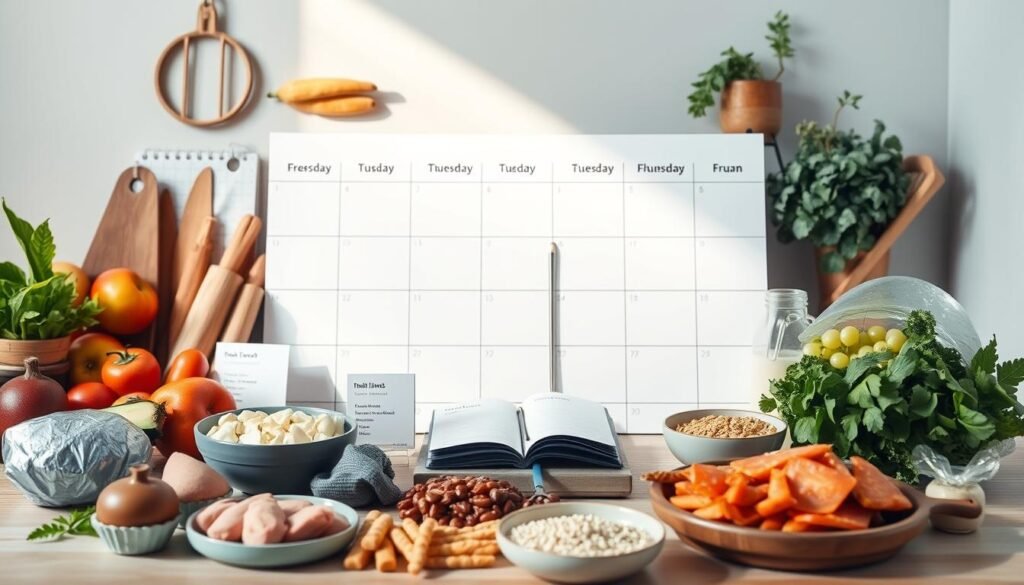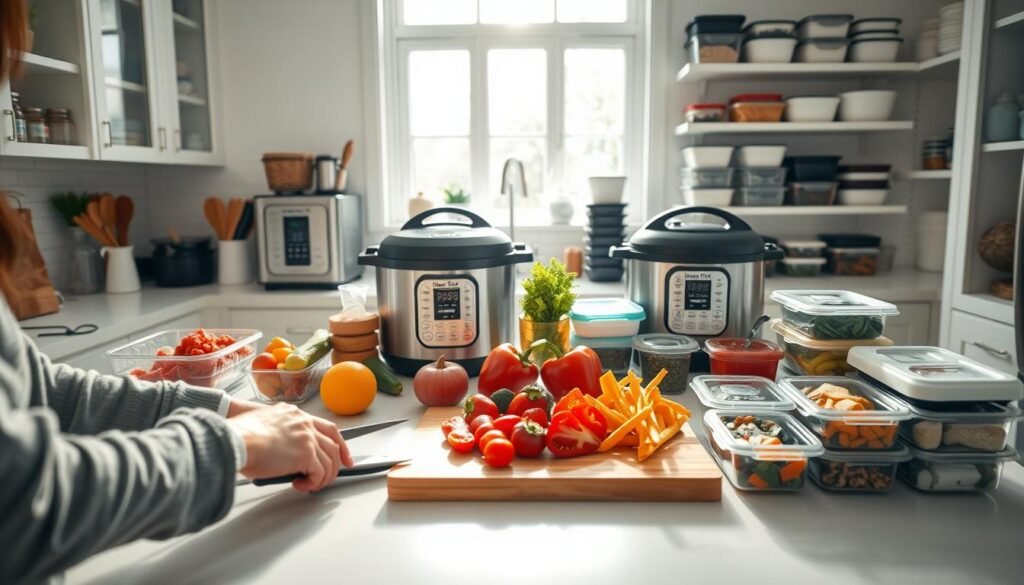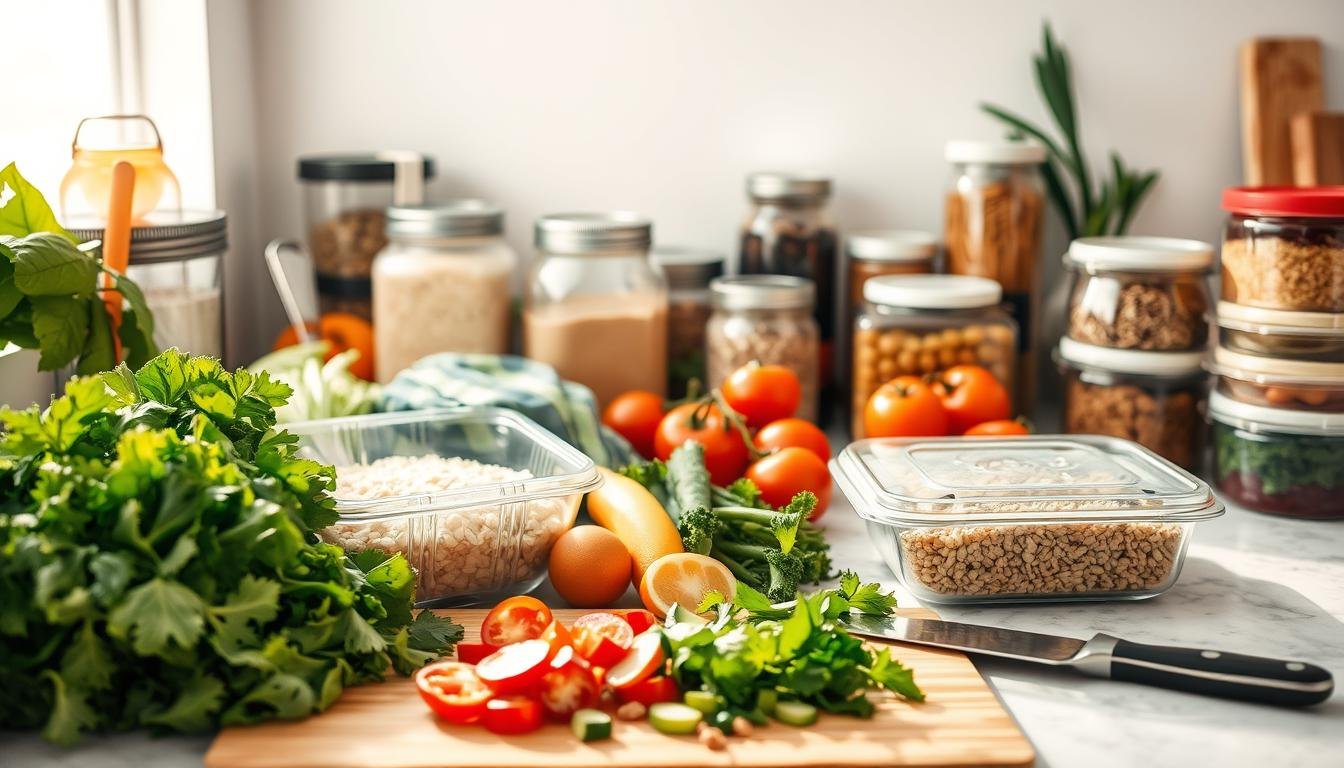Every time I opened my fridge and saw wilting veggies or forgotten leftovers, I knew I had to change. Like many Americans, I found meal prep for savings was key. Turning my kitchen into a meal planning hub wasn’t just about saving money. It was about taking back control of my budget and health.
Budget-friendly meal planning is not a luxury; it’s a smart move for anyone looking to stretch their dollars. By spending a few hours each week on meal prep, you can cut down on food waste and impulse buys. You’ll also make delicious, healthy meals that support your health and wallet.
Whether you’re a busy pro, a student on a tight budget, or just looking to spend smarter, meal prep can change your eating and spending habits.
Key Takeaways
- Meal prepping can significantly reduce weekly food expenses
- Planning meals helps minimize impulse buying and food waste
- You can save money without sacrificing nutrition or taste
- Consistent meal preparation builds valuable cooking skills
- Strategic shopping and bulk purchasing maximize savings
Understanding the Basics of Meal Prepping
Meal prepping has changed how we cook and save money. It makes meal planning easier, saving time, money, and stress. It’s a smart way to manage your kitchen.
What is Meal Prepping?
Meal prepping means cooking meals ahead of time. You set aside a few hours to make meals for days or a week. This way, you get healthy meals that fit your budget and goals.
Benefits of Meal Preparation
- Financial Savings: Cut down on dining out and food waste
- Time management: Less time spent cooking every day
- Healthier eating habits: Better control over what you eat
- Reduced stress around meal planning
- Consistent nutrition all week
Who Should Consider Meal Prepping?
Meal prepping suits many lifestyles and people, including:
- Busy professionals
- Students with little time
- Health-conscious folks
- Those on a tight food budget
- People with special dietary needs
Meal prepping is great for saving money and making cooking easier. It’s flexible and fits your needs and schedule.
Essential Tools and Equipment for Successful Prep
Starting your meal prep journey means having the right kitchen tools. You don’t need to spend a lot on fancy gadgets. But, some tools can really help you save money and work more efficiently.
Your meal prep toolkit should have a few key items. These make cooking and storing meals a breeze:
- Large Non-Stick Pan: Great for cooking proteins and veggies in bulk
- Multi-Purpose Cooking Utensil Set
- Quality Mixing Bowls
- Durable Meal Prep Containers
- Large Pot for Batch Cooking
- Muffin Tin for Individual Portions
Choose tools that are versatile and durable. Look for items that can do more than one thing. This helps you use your kitchen space and money wisely. Glass containers with tight lids are perfect for keeping meals fresh and leak-free.
If you’re watching your budget, start with the basics and add more as you go. You can find affordable tools at kitchen stores or online. The goal is to pick items that make cooking easier and fit your budget.
Pro tip: Opt for tools that can do many things. A single, high-quality tool is often better than buying lots of specialized gadgets.
Meal Prep for Savings: Smart Shopping Strategies
Learning to save money on groceries starts with smart shopping. Your success in meal prep depends on making choices that save money and still taste great. The right strategy can make your weekly grocery shopping more affordable.
Smart shoppers plan ahead to save money. Before you go to the store, make a detailed plan. This plan should help you avoid waste and get the most value from your shopping.
Creating a Budget-Friendly Shopping List
Making a good grocery list is key. Your list should include:
- Staple ingredients that last a long time
- Versatile protein sources
- Seasonal produce
- Pantry essentials for many recipes
Seasonal Buying Tips
Buying seasonal produce can save a lot of money. When fruits and vegetables are in peak season, they cost less. Local farmers markets often have the best deals on fresh, seasonal items.
Bulk Purchase Guidelines
Buying in bulk can really help your budget. Focus on non-perishable items and things you use a lot. Here are some tips for bulk buying:
- Compare prices per unit
- Check expiration dates
- Store bulk items correctly
- Share large quantities with friends or family
By following these tips, you can change how you shop for groceries. Smart shopping saves money and reduces stress. This way, you can enjoy tasty, homemade meals without spending too much.
Planning Your Weekly Meal Schedule

Creating a weekly meal schedule is key to saving money on food. It’s all about finding a simple way to cook that also saves your wallet. This strategy makes cooking easier and keeps your budget in check.
Begin by figuring out your toughest meal time. It could be breakfast, lunch, or dinner. Start with that meal to build your confidence in cooking. As you get better, you can plan more meals.
- Choose one meal time to master initially
- Create a flexible meal template
- Incorporate versatile ingredients
- Plan for leftovers and repurposing meals
Your meal planning should include a few important steps:
- Inventory check: Check what you already have in your pantry and fridge
- Recipe selection: Pick recipes that use the same ingredients
- Batch cooking: Cook large batches of basic ingredients
- Flexible meals: Choose dishes that can be easily changed up
Meal planning on a budget needs creativity and smart thinking. Look for recipes that can turn into different meals. This way, you waste less food and save money. Spending time on meal prep now will save you time and money later.
Best Foods for Meal Prepping
Choosing the right ingredients is key for cost-effective meal prep. It saves money and time. Foods that store well and stay fresh are essential.
Knowing which foods keep their freshness is crucial. The right picks make delicious, affordable meals all week.
Foods That Store Well
- Grains: Rice, quinoa, and oats
- Proteins: Chicken, beans, hard-boiled eggs
- Vegetables: Carrots, broccoli, cauliflower
- Legumes: Lentils, chickpeas
Foods to Avoid in Meal Prep
- Crispy vegetables that become soggy
- Delicate leafy greens
- Fried foods that lose texture
- Cream-based sauces
Storage Duration Guidelines
| Food Category | Refrigerator Storage | Freezer Storage |
|---|---|---|
| Cooked Meats | 3-4 days | 2-3 months |
| Cooked Grains | 4-5 days | 1 month |
| Roasted Vegetables | 3-4 days | 2-3 months |
Follow these guidelines to save money and reduce waste. Strategic food selection is vital for meal prep success.
Time-Saving Prep Techniques
Learning to cook in batches can save you a lot of time in the kitchen. With a few smart tricks, you can make your meal prep faster and cheaper. This way, you can enjoy delicious meals without spending too much.
Kitchen multitasking is a game-changer for those with busy schedules. You can roast veggies while cooking grains or making a slow cooker meal. This method makes your cooking time more efficient and saves you hours in the kitchen.
- Prep ingredients in advance
- Use multiple appliances simultaneously
- Chop vegetables in bulk
- Marinate proteins ahead of time
Try a batch cooking system where you cook a lot on weekends. This way, you can make meals for the week ahead. It saves you time and money, making your cooking routine more affordable.
Planning your meals can also make a big difference. Cooking more at once and portioning meals saves time and reduces waste. Your wallet and schedule will appreciate these smart tips.
- Cook proteins in large batches
- Pre-chop and store vegetables
- Use freezer-friendly containers
- Label and date your prepared meals
Spending a few hours on prep work can lead to tasty, affordable meals all week. These efficient strategies turn your budget-friendly meal dreams into reality.
Storage Solutions and Container Options
Effective storage is key for saving money on meals and reducing food waste. The right containers help keep food fresh and save you money.
Choosing the right containers is important. Different foods need different storage to stay fresh and healthy.
Container Types for Meal Prepping
- Glass Containers: Great for hot meals and reheating in the microwave
- Plastic Containers: Light and affordable
- Silicone Containers: Flexible and easy to store
Organization Methods
Good organization can save you money on food prep. Here are some tips:
- Label containers with the prep date
- Stack containers neatly in the fridge
- Use clear containers for easy viewing
| Container Type | Best For | Cost Efficiency |
|---|---|---|
| Glass | Hot Meals | Medium |
| Plastic | Cold Meals | High |
| Silicone | Varied Meals | Low |
Buying good containers is a smart move. They may cost more upfront, but they save you money in the long run. You’ll waste less food and prep meals more efficiently.
Batch Cooking Fundamentals

Batch cooking is a great way to save time and money. It lets you cook a lot of food at once. This way, you can have healthy meals ready without stress.
To start batch cooking, here are some tips:
- Choose recipes that freeze and reheat well
- Invest in quality storage containers
- Plan your cooking sessions strategically
- Focus on versatile ingredients
Choosing the right recipes is key. Pick dishes that stay tasty and fresh after freezing. Soups, stews, casseroles, and grain-based meals are perfect for saving money.
| Meal Type | Freezer Storage Time | Reheating Recommendation |
|---|---|---|
| Soups and Stews | 3-4 months | Slow cooker or stovetop |
| Casseroles | 2-3 months | Oven at 350°F |
| Grain Bowls | 1-2 months | Microwave or skillet |
Pro tip: Use labels on your containers. Write the meal name and date. This helps you keep track and avoid wasting food.
Conclusion
Starting a budget-friendly meal planning journey can change how you see food and money. It’s not just about saving money. It’s about building healthy habits that help your wallet and body.
Begin with small steps in meal prep. You don’t have to change everything at once. Start with one or two meals a week. This will help you get better at saving money and time.
Sticking to budget-friendly meal planning has big benefits. You’ll spend less on food each month. You’ll also eat healthier and avoid expensive takeout.
Every meal you prep is a step towards better health and money management. It’s a journey that’s unique to you. With time, you’ll find a way to cook that saves money and makes you happy.

